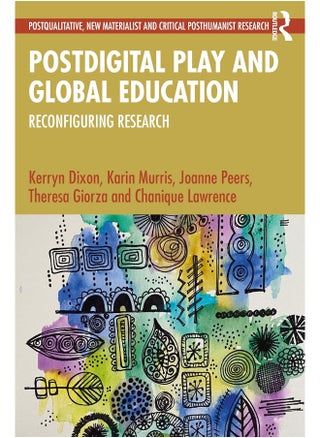Free & Easy Returns
Best Deals

| Publisher | Routledge |
| ISBN 10 | 1032070277 |
| Book Format | Paperback |
| Book Description | Postdigital Play and Global Education: Reconfiguring Research is a re-turn to a large-scale, international project on children’s digital play. Adopting postqualitative and posthumanist theories, research practices are reconfigured all the way down from what counts as ‘data’, ‘tools’, ‘instruments’, ‘transcription’, research sites’, ‘researchers’, to notions of responsibility and accountability in qualitative research. Through a series of vignettes involving complex human and more-than-human collaborators (e.g., GoPros, octopus, avatars, diaries, sackball, LEGO bricks), the authors challenge who and what can be playful and creative across contexts in the global north and global south. The diffractive methodology enacted interrupts Western developmental notions of agency that are dominant in research involving young children.The concept of ‘postdigital’ offers fresh opportunities to disrupt dominant understandings of children’s play. Play emerges as an enigmatic and shape-shifting human and more-than-human agentic force that operates beyond digital/non-digital, online/ offline binaries. By attuning to race, gender, age and language, invisible and colonising aspects of postdigital worldings the authors show how global education research can be reimagined through a posthumanist decentering of children without erasure.Postdigital Play and Global Education puts into practice Karen Barad’s agential realism, but also a range of postdevelopmental and posthumanist writings from diverse fields. The book will be of particular interest to researchers looking for guidance to enact agential realist and posthumanist philosophies in research involving young children. |
| Publication Date | 24 September 2024 |
| ISBN 13 | 9781032070278 |
| Author | Kerryn Dixon |
| Language | English |
| About the Author | Kerryn Dixon is Associate Professor at the University of Nottingham, UK. Her teaching and research are in the field of language and literacy studies, specialising in early literacy and critical literacy. She is particularly interested in the interrelationships between language, literacy, and power in contexts of poverty.Karin Murris is Professor of Early Childhood Education at the University of Oulu, Finland, and Emerita Professor of Pedagogy and Philosophy, University of Cape Town, South Africa. She is a teacher educator, grounded in academic philosophy and a postqualitative research paradigm. Her main interests are in posthuman child studies, philosophy in education, ethics, and democratic pedagogies. Website: www.karinmurris.com.Joanne Peers is a PhD candidate at The University of Oulu, Finland, pursuing relationality in environmental education through thinking with bodies and water. Her interest in justice in the global south is woven through her role as Head of Academics at The Centre for Creative Education in Cape Town.Theresa Giorza is a researcher and teacher in Childhood Studies with an interest in arts-based pedagogies and philosophical enquiry. She is based at the Centre for Creative Education in Cape Town. Her book, Learning with Damaged Colonial Places: Posthumanist Pedagogies from a Joburg preschool was published in 2021 by Springer.Chanique Lawrence is an experienced Linguist, who has worked as a professional translator and transcriber. As a Linguist her work is focussed on representing global south communities. Currently based in the Netherlands, Chanique is pursuing her Master’s at Leiden University where she is focusing on Human Rights Law. |
| Number of Pages | 272 pages |

